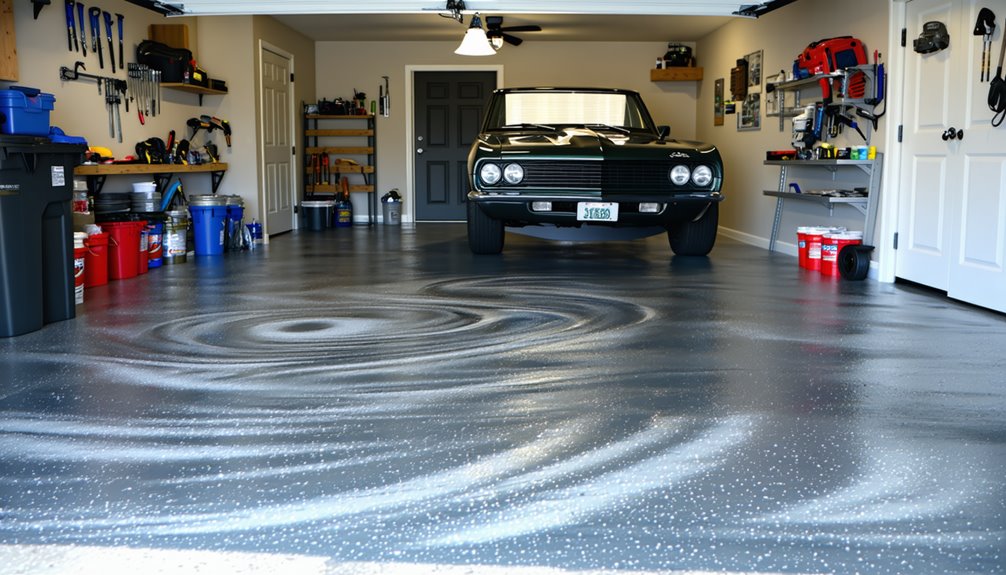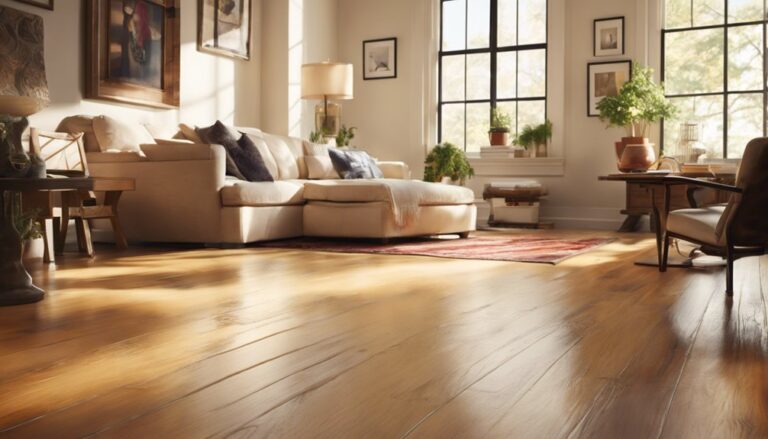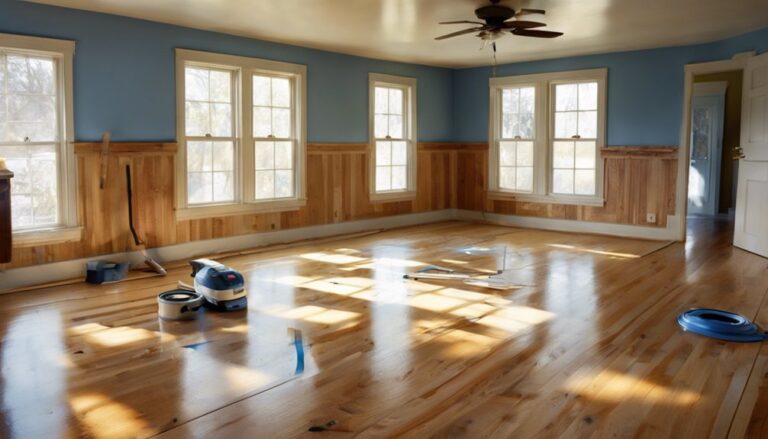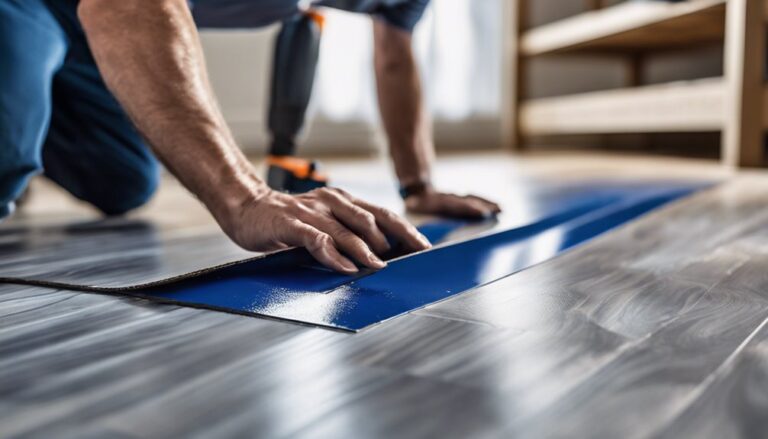Epoxy flooring for your garage usually costs between $3 and $12 per square foot. This price varies based on factors like the quality of the epoxy, your garage size, and whether you opt for DIY installation or hire a pro. DIY projects can save you money on labor but might compromise the quality. Don't forget to factor in surface preparation and any unexpected repairs, which can add to your total costs. Knowing these details helps you plan your budget effectively. If you're curious about what else influences these costs, keep exploring to uncover more insights.
Factors Affecting Cost
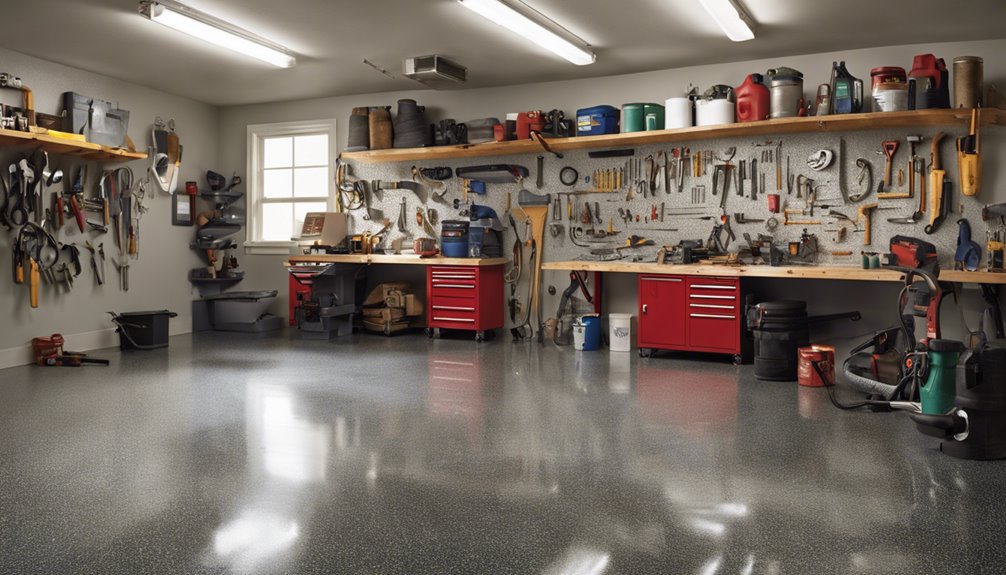
When considering how much to epoxy your garage floor, it's essential to recognize that several factors can influence the overall cost. First, the type of epoxy finishes you choose can greatly affect pricing. High-quality finishes may cost more but often provide better durability and aesthetics.
Next, the installation techniques play an important role. Whether you're opting for a DIY project or hiring professionals, labor costs can vary widely. A skilled installer may charge more but guarantee a smooth, long-lasting result.
Additionally, the size of your garage and any necessary surface preparations, like repairs or cleaning, can further impact the final cost. By understanding these factors, you can make informed decisions that align with your budget and desired outcome.
Material Options
When considering epoxy for your garage floor, it's crucial to understand the different types available and how they compare. Each type of epoxy comes with its own cost, which can greatly affect your overall budget. By evaluating these material options, you can make an informed choice that meets your needs and fits your financial plan.
Epoxy Types Comparison
Although choosing the right epoxy for your garage floor may seem intimidating, understanding the different types available can simplify the decision. When considering epoxy, you'll want to weigh factors like durability and aesthetics. Here's a quick comparison to help you out:
- High-Performance Epoxy: Best for extreme durability.
- Water-Based Epoxy: Offers an eco-friendly option with varied epoxy color options.
- Solvent-Based Epoxy: Known for its strong adhesion and robust finish.
- Polyaspartic Epoxy: Great for quick installations and UV resistance.
- Epoxy Floor Coatings: Affordable choices for DIY projects.
Cost of Materials
The cost of materials for epoxy garage flooring can vary considerably based on the type you choose and the size of your garage. Different epoxy brands offer a range of prices, from budget-friendly options to premium products. Generally, expect to spend between $1.50 to $5 per square foot, depending on the quality and material durability. Higher-end brands often provide better resistance to stains, chemicals, and wear, making them a worthwhile investment for long-term use. If you're looking for a DIY project, remember to factor in additional materials like primers, topcoats, and tools. By choosing wisely, you can achieve a stunning and durable garage floor that satisfies your desire for freedom and functionality.
DIY vs. Professional Installation
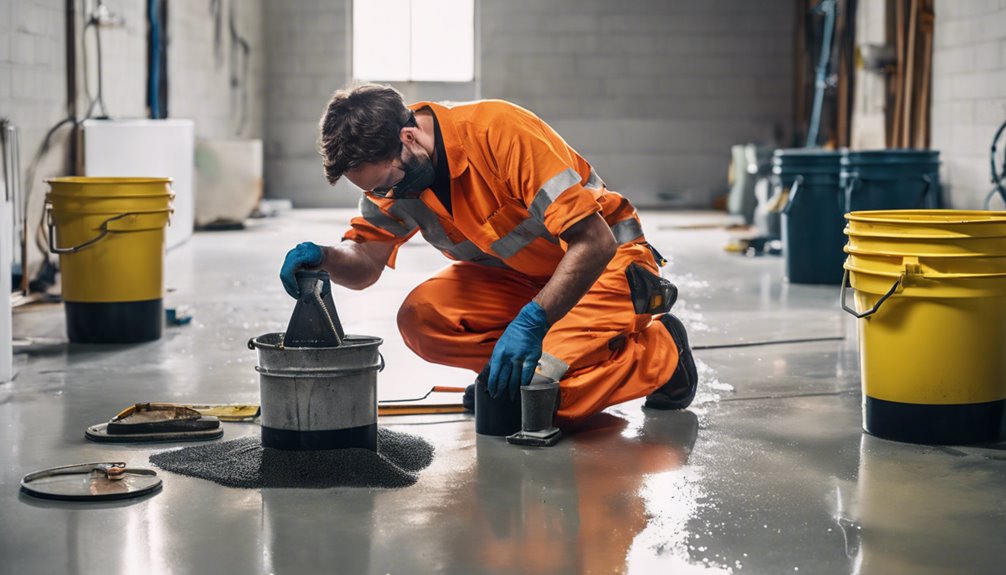
When considering whether to tackle your epoxy garage floor as a DIY project or hire a professional, it's important to weigh the cost, skill level, and time investment involved. DIY might save you some cash, but it requires a certain level of expertise and can be time-consuming. On the other hand, professionals can guarantee a smooth finish, but their services come at a premium.
Cost Comparison
Deciding between a DIY approach and hiring a professional for your garage floor epoxy project can greatly impact your budget. Understanding the cost breakdown of both installation methods is essential for making an informed decision.
Consider these factors when weighing your options:
- Materials: DIY costs may include epoxy kits, while professionals have their own supplies.
- Labor: You'll save on labor costs with DIY, but professionals charge for their expertise.
- Time: DIY projects can take longer, while pros can get it done efficiently.
- Quality: Professionals often deliver a polished finish, while DIY might vary.
- Warranty: Many pros offer warranties that DIY doesn't.
Ultimately, it's about balancing cost and quality to suit your needs.
Skill Level Required
While tackling a garage floor epoxy project yourself can be rewarding, it requires a certain level of skill and knowledge. If you're a beginner, it's vital to familiarize yourself with basic techniques like surface preparation and mixing the epoxy. You might find online tutorials helpful for mastering the fundamentals. However, if you're aiming for a professional finish, consider researching advanced tips, such as proper application methods and curing processes. Knowing when to invest time in learning versus hiring a pro is significant. If you feel confident in your skills and have the right tools, go for the DIY approach. But if you're unsure, hiring a professional can guarantee a durable and aesthetically pleasing result, saving you potential headaches down the line.
Time Investment Needed
The time investment for epoxying your garage floor can vary considerably depending on whether you choose the DIY route or hire a professional. If you're tackling this project yourself, you'll need to manage your time effectively to stick to your project timeline. Expect to spend:
- 1-2 days for preparation and cleaning
- 1 day for epoxy application
- 3-4 days for curing time
- Additional time for any touch-ups
- About a week total for completion
On the other hand, hiring a professional can greatly reduce your time commitment, often completing the job in just a day or two. Weigh your options carefully based on how much freedom you want in your schedule!
Size of the Garage
When considering how much epoxy you'll need for your garage floor, the size of your garage plays an essential role. Your garage dimensions directly impact how much material you'll require. For instance, a standard two-car garage typically measures around 400 to 600 square feet, while a larger garage can exceed 800 square feet. Knowing these measurements helps you estimate the amount of epoxy to buy, ensuring you don't waste money or time. Effective space utilization is key, especially if you plan to add storage or workspace. By understanding your garage's size, you can make informed decisions about your epoxy needs, allowing you to transform your garage into a clean, durable space that meets your lifestyle.
Average Cost Breakdown
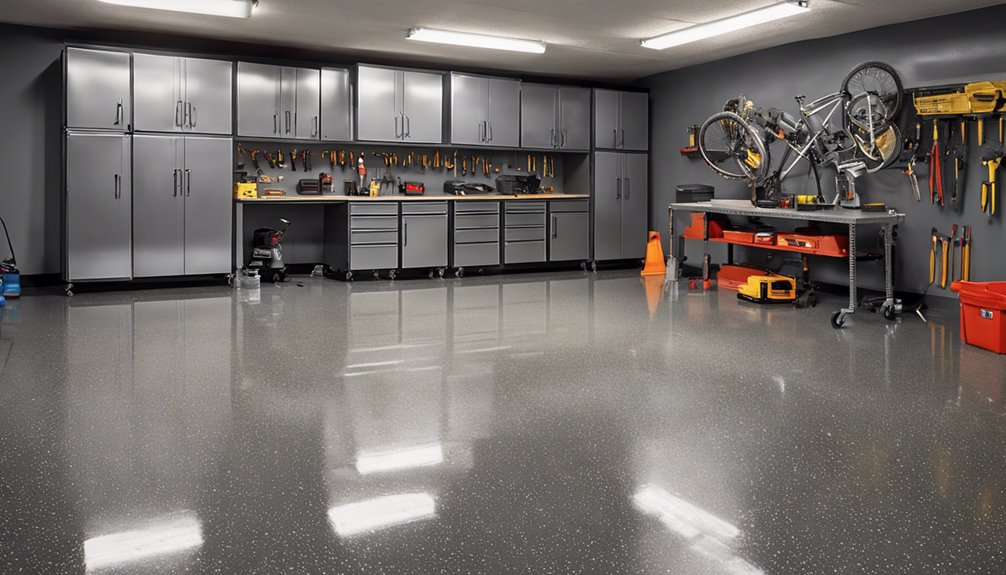
Understanding the average cost breakdown for epoxy garage floor installation can save you both time and money. When considering cost estimation, keep in mind several factors that influence the final price:
- Material Costs: Quality epoxy resins and additives can vary.
- Labor Fees: Hiring professionals versus DIY affects overall costs.
- Preparation Work: Floor cleaning and repairs may be necessary.
- Installation Techniques: Different methods impact material needs and labor time.
- Size of the Garage: Larger spaces will naturally increase costs.
Additional Expenses
Additional expenses can sneak up on you when planning an epoxy garage floor installation. It's essential to account for potential additional fees and unexpected costs that might arise. Here's a quick overview to help you anticipate what you might face:
| Expense Type | Estimated Cost Range | Notes |
|---|---|---|
| Surface Preparation | $1 – $2 per sq ft | Cleaning, repairs needed |
| Primer | $0.50 – $1 per sq ft | Required for adhesion |
| Tools Rental | $50 – $150 | If you DIY the project |
| Decorative Add-ons | $100 – $500 | Flakes, color choices |
Being aware of these potential costs can help you keep your budget on track and guarantee a smooth installation process.
Tips for Budgeting
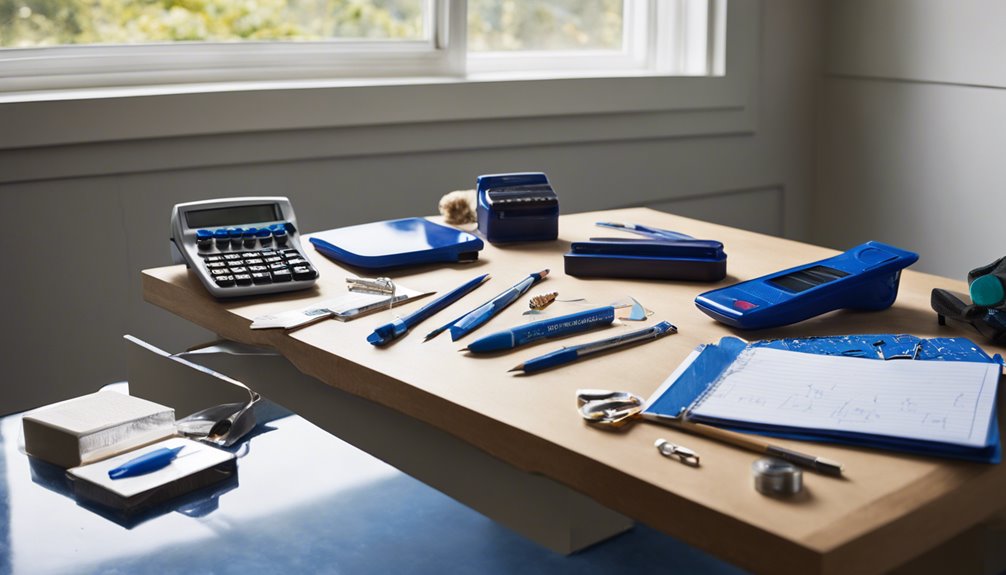
Budgeting for an epoxy garage floor can feel challenging, but with a few strategic tips, you can manage costs effectively. Here are some budgeting strategies and cost-saving tips to contemplate:
- Research materials: Compare prices from different suppliers to find the best deals.
- DIY installation: If you're handy, think about doing the job yourself to save on labor costs.
- Plan for extras: Allocate a bit of your budget for unexpected expenses like repairs or additional materials.
- Buy in bulk: Purchase larger quantities to benefit from discounts.
- Timing matters: Consider seasonal sales or off-peak times for potential cost savings.
With these strategies, you'll be on your way to a stunning garage floor without breaking the bank!
Frequently Asked Questions
How Long Does an Epoxy Garage Floor Installation Typically Take?
When you're transforming your garage with an epoxy floor, think of it as crafting a masterpiece. The installation timeline usually spans one to three days, depending on the size and complexity of your space. After applying the epoxy, you've got to factor in the curing process, which can take anywhere from 24 hours to a week before it's fully ready for use. Patience is key, but the results are worth the wait!
Can I Apply Epoxy Over Existing Flooring?
Yes, you can apply epoxy over existing flooring, but there are some epoxy preparation tips you should follow. First, make certain the existing surface is clean, dry, and free from any damage. Additionally, consider flooring compatibility concerns; not all materials work well with epoxy. For the best results, you might need to test a small area first. With the right approach, you'll achieve a durable, attractive finish that reveals your garage's potential!
What Colors Are Available for Epoxy Garage Floors?
What's more satisfying than customizing your garage floor with the perfect color? You've got a range of color options to choose from, including classic grays, vibrant reds, and even stunning metallics. These choices allow you to add those finishing touches that reflect your personal style. Whether you want a sleek professional look or something bold and eye-catching, the right color can transform your space and give you that sense of freedom you crave.
How Durable Is an Epoxy Garage Floor?
Epoxy garage floors are incredibly durable, offering impressive longevity that can last over a decade with proper care. They resist stains, chemicals, and abrasions, making them perfect for heavy use. You'll find that surface maintenance is minimal; just a quick sweep and occasional mopping will keep it looking great. If you want a floor that stands up to wear and tear while maintaining its aesthetic, epoxy's the way to go!
Is Epoxy Flooring Resistant to Chemical Spills?
Yes, epoxy flooring is known for its excellent chemical resistance, making it a great choice for areas prone to spills. If you spill something, cleanup is usually straightforward, as most chemicals won't penetrate the surface. However, it's wise to wipe up spills promptly to maintain the floor's integrity. By choosing epoxy, you're ensuring a durable surface that can handle everyday messes without breaking down or requiring extensive maintenance.

